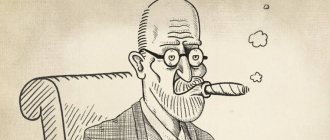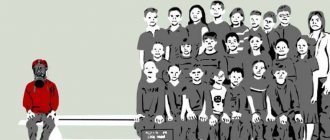Compensation in psychology is a mental defense mechanism aimed at independently overcoming negative qualities that actually exist or are subjectively perceived by a person. By resorting to it, a person tries to compensate for his shortcomings by developing other, balancing or replacing traits. So a small person, who worries about this, strives for a high social position, making significant efforts for his goal and ultimately gets what he wants thanks to his increased motivation. And a girl who is not recognized by her peers, who is not accepted into a children's company, as a teenager begins to experiment with her appearance and in adulthood can become a famous model. At the same time, those around her have no idea about her childhood complexes, which became the key to success. However, compensation can also be over-expressed, excessive, then it is called hypercompensation.
Compensation - what is it?
In psychology, compensation is one of the methods of psychological defense in which a person replaces shortcomings with something. They come in three types:
- Visible. These are the shortcomings that clearly catch your eye. These include: absence of limbs, various neoplasms on open parts of the body, scars, consequences of burns, etc. Most people form an opinion about themselves based on what society says. And if we take into account the fact that society is rarely tolerant and tactful, we can conclude that such people almost always live in a state of stress.
- Invisible. Such disadvantages include disturbances in the functioning of internal organs, which negatively affect the functioning of the body as a whole and the psychological state.
- Imaginary or fictitious. A person invents shortcomings for himself or they are the result of psychological trauma that happened in childhood. So, for example, someone considers himself very ugly, although in fact his appearance is no worse than that of the people around him.
Compensation is required for each of the listed types of deficiencies. It is interesting that it can be connected both with the deficiency itself and with the aspirations that replace it. In the first case, Paralympic athletes can be used as an example, and in the second, blind musicians, etc.
Alfred Adler was the first to talk about compensation mechanisms. According to him, compensation for inferiority is a normal phenomenon in the life of every person. Inferiority, as Adler believed, is of three types:
- Physiological - absence of body parts, hearing, vision, etc.
- Socio-cultural - these are age, gender, political and economic differences that can make you feel inferior.
- The original one is biological inferiority, which throughout the history of mankind has encouraged people to develop science, technology, art and other areas.
Sigmund Freud did not agree with Adler's words. He said that inferiority does not always deprive a person of a happy life. As an example, he cited people who, even in the absence of any parts of the body, or, for example, vision, did not lose self-confidence, did not feel discriminated against or offended by fate. Freud believed that it is easier to find someone who is prone to narcissism than those who consider themselves inferior people.
Trying to object, Adler argued that the inferiority complex is only an idea that can explain the psychological processes occurring in the body. There is no need to talk about actual usefulness here, because it is relative. For each individual, nation and culture, the concept of a full-fledged personality may change.
In fact, inferiority is a so-called motivator that prompts us to action and activates the compensation process.
Law of Response Uncertainty
Depending on the existing personal experience, direct or gleaned from others, a person perceives what is happening, taking into account the existing stereotypes of consciousness, i.e., stable opinions, assessments and judgments. They make adjustments to the understanding of the situation, narrowing it to the framework specified by the stereotype. This is why different people react differently to the same thing. “And experience, the son of difficult mistakes...”
On the other hand, at different times, under different conditions, including one’s own mood, etc., the same person can perceive the same information differently. Remember, in “An Ordinary Miracle” by E. Schwartz, the King’s ancestors “awakened” in his soul, dictating this or that reaction to what was happening?..
More than once I witnessed how, after a production meeting at which specific decisions were made, employees dispersed, continued discussing issues and... came to other options. And when the manager, approaching the deadline, asked: “Where?”, they answered in all honesty that they considered it more correct to do otherwise... Wow, right? The final response was beyond the reach of the manager - the person responsible for the project as a whole.
Kinds
Compensation can be direct or indirect. The first involves trying to become successful in precisely the area that is directly related to the deficiency. The second speaks of the desire to achieve success in a different direction.
In psychology, there are also these types of compensation:
- real;
- over or overcompensation;
- pseudo-compensation.
Let's look at each of them in more detail.
Real
What is real compensation in psychology? This is the ability to adapt to new living conditions. It concerns those people who previously considered themselves inferior, but then were able to cope with their shortcomings and now lead a normal life.
Alfred Adler identified a number of conditions necessary to activate compensation of this type:
- desire to achieve superiority;
- desire to gain power;
- perseverance and willpower;
- interest in what is happening around.
Adler was sure that this type of compensation occurs in almost all people who, to one degree or another, are faced with an inferiority complex.
Overcompensation
It represents increased attention to an underdeveloped ability or weak part of the body, and their enhanced development. This also includes working with other organs and abilities whose training will help you achieve success.
So, for example, a person who has difficulties communicating with people around him can, as compensation, delve deeper into the study of languages or some sciences. In this way he will replace his deficiency and become a genius.
Pseudocompensation
In the case of this type, compensation occurs not due to the fact that a person directs efforts towards his own development, but through the manipulation of other people.
The reasons for the occurrence of pseudo-compensation were named by Adler:
- Physical disabilities that negatively affect health or provoke constant psychological stress.
- Overprotection, excessive care, forgiveness of absolutely all shortcomings and misdeeds, leading to the development of selfishness, capriciousness, and intolerance.
- Lack of love, lack of communication with family and friends, lack of opportunity to talk openly with someone. All this leads to the fact that a person can no longer trust others and loses the ability to be a friend and love.
There are several ways in which pseudocompensation can manifest itself:
- Complete withdrawal from illness. A person uses his condition to manipulate others. This happens even in cases where the disease does not have any serious consequences. Always and everywhere he expects indulgences, presses on the feeling of pity, asserts himself at the expense of others, and also uses them to achieve his own goals.
- Withdrawal into weakness. Here a person tries on the role of a victim, becoming weak and helpless. He draws extremely bad scenarios for himself, kills ambitions in the bud, and does not set goals. But that’s not even the worst thing. The point is that he does it consciously.
- Superiority. The exact opposite of inferiority. Trying to get away from an unpleasant feeling, a person does everything to become indispensable, better than everyone else.
- Laziness. An individual who considers himself inferior refuses to do anything in order to avoid possible problems.
- Self-promotion. People who have some shortcomings try by any means to show themselves to others from their advantageous side. It is important for them to receive approval and praise. That is why they depend so much on other people's opinions.
Emotions and their inherent defense mechanisms
As we know, the above protective mechanisms fit into Plutchik’s psycho-evolutionary model of emotions. Moreover, each of the defenses is “responsible” for coping with a specific emotion. Let's take a closer look at this side of the theory.
The relationship between emotions and defense mechanisms forms a system:
- Joy is the translation of this reaction into another, often its opposite, suppression of pleasant sensations from an object and situation (reactive formation). For example, this could be a ban on pleasant experiences or pleasure, or disgust. Overestimation of the stimulus “Everything about this is disgusting.”
- Sadness (from the loss of a significant object or self-esteem) - compensation, for example in the form of fantasies or expansive behavior. Interpretations and rethinking “But I... Still I... Someday I...”
- Anger is a replacement. It can take the form of redirected aggression, self-aggression, and destructive behavior. Interpretation: “That’s who is to blame for everything.”
- Fear – suppression, avoidance. The stimulus is overestimated in “This is unfamiliar to me.”
- Anticipation/expectation - intellectualization, that is, rationalization, the desire for control through logical explanations, analysis and introspection - “Everything is explainable.”
- Surprise - regression, that is, a return to an earlier psychological state, infantilism. Interpretation: “You must help me.”
- Disgust is a projection, the transfer of one’s own unacceptable properties or inferiority onto others. Expressed in particular criticality, demandingness, and hostility. Revaluation of the stimulus “All people are vicious.”
- Acceptance is denial, ignoring certain facts that conflict with one’s own values, ideals, perceptions, peace of mind, which allows one to continue to accept others.
To summarize, we can say that the Life Style Index (LSI) system, introduced in 1979, is a working tool for diagnosing the psychosocial characteristics of a person and his typical psychodefense mechanisms. This model, created by Plutchik, Kellerman and Conte, identifies 8 main psychological defenses. They correspond to Plutchik's 8 basic emotions and are developed to best experience a dominant or strong emotion. An individual may have any number of defense mechanisms, which are unique ways of adapting to the situation.
Compensation as a type of psychological protection
As with other types of psychological defense, the task of compensation is to protect the psyche from the influence of negative emotions. It begins in childhood, when the child understands what needs to be done in order to become valuable in the eyes of others and to gain approval. For example, many are told that they will be loved and respected only if they become rich. This encourages grown-up children to direct all their strength and capabilities to making money.
If we consider compensation as a psychological defense mechanism, then we can say that it is an escape from problems. Compensating for his shortcomings, a person tries to escape reality. He doesn't want to find out why his life is bad in his current circumstances.
The opinion of the majority plays a big role in this matter. Many of us are used to agreeing with him. And this is not surprising, since people who look at things differently are often considered crazy. Over time, a person begins to think about himself the same way. At this moment, compensation is activated, encouraging one to fight against imaginary inferiority.
Compensation is also considered to be the inability to adequately perceive oneself as a person with shortcomings (real or imagined). Unable to accept them, a person tries to either get rid of them or make them his advantages.
On the one hand, it may seem that compensation really helps. But on the other hand, it forces a person to live the way society wants, and not he himself. Everything is fine as long as he masks or compensates for his shortcomings and inferiority. But as soon as they come out, a lot of tension arises.
Summarizing
Despite all its complexity and confusion, the model of defense mechanisms by Plutchik, Kellerman and Conte can be a good practical tool for greater awareness and effectiveness in life. We invite you to once again go through the list of possible psychological defenses and answer the questions:
- What defense mechanisms have you noticed in yourself?
- Is there one among them that you use more often than others?
- Which of these reactions do you find difficult to control and be aware of when you resort to them?
- And most importantly, what other ways to cope with unpleasant events, feelings or your shortcomings are there? How else can you react and behave? What approach or behavior will be most effective and beneficial in the long term?
The more aware you are of your unconscious psychological defenses, the less they control you and are automatic. This way, it is possible not only to choose the most optimal behavior, but also to become the master of your reactions and your life. If you are interested in developing the skills of awareness and management of your emotions, we draw your attention to the online program “Mental Self-Regulation”. This course teaches the ability to control and harmonize your mental states, which improves your quality of life.
We wish you good luck!
We also recommend reading:
- Storytelling
- Sublimation in psychology
- Hakomi Therapy
- Emotions and health: how they are interconnected
- Defense mechanisms of the psyche
- Robert Plutchik's Theory of Emotions
- Reframing Your Dark Side
- Fear: psychological foundations and famous scientific studies of this phenomenon
- Behavioral mechanisms
- Intelligence: definition, development and degradation
- Fundamentals of neuroeconomics: how do we make decisions?
Key words: 1Cognitive science, 1Psychoregulation
Examples of compensation
The simplest and most understandable example of compensation is connected, no matter how funny it may sound, with food. When a person does not consume certain foods, for example, while on a diet, the body demands to replace them with something else, something that contains the nutrients it needs. So, if you really want ice cream, you lack calcium and tryptophan. You can get them from chicken, rabbit or turkey. An irresistible desire to eat chocolate indicates a magnesium deficiency. You can replenish it with buckwheat, pine nuts, and lettuce.
Let's move on to examples related to people. Imagine a skinny teenage boy. People laugh at him because of his appearance. But he doesn't rush to the gym to pump up. Instead, he does what he does best: play chess. And he will definitely achieve success in this direction. But physical defects will still remind you of themselves, which will ultimately lead to the development of neuroses.
Let's take the same frail teenager. In the previous example we were talking about compensation. If overcompensation turns on, he will direct all his strength to eliminate the deficiency, will intensively engage in sports, wrestling, in order to then take revenge on those who teased and offended him.
Compensation is cases when, instead of establishing relationships with others, a person gets a dog. Having a pet is, of course, good. But if you communicate only with him, then over time you can lose your communication skills with people and end up alone.
Another example of compensation is career. It replaces family, entertainment, and friends. There is some benefit to this. A person achieves success and recognition in society. But look from the other side. Over time, the body of workaholics simply gets tired. And no job or career will give you a feeling of real happiness.











